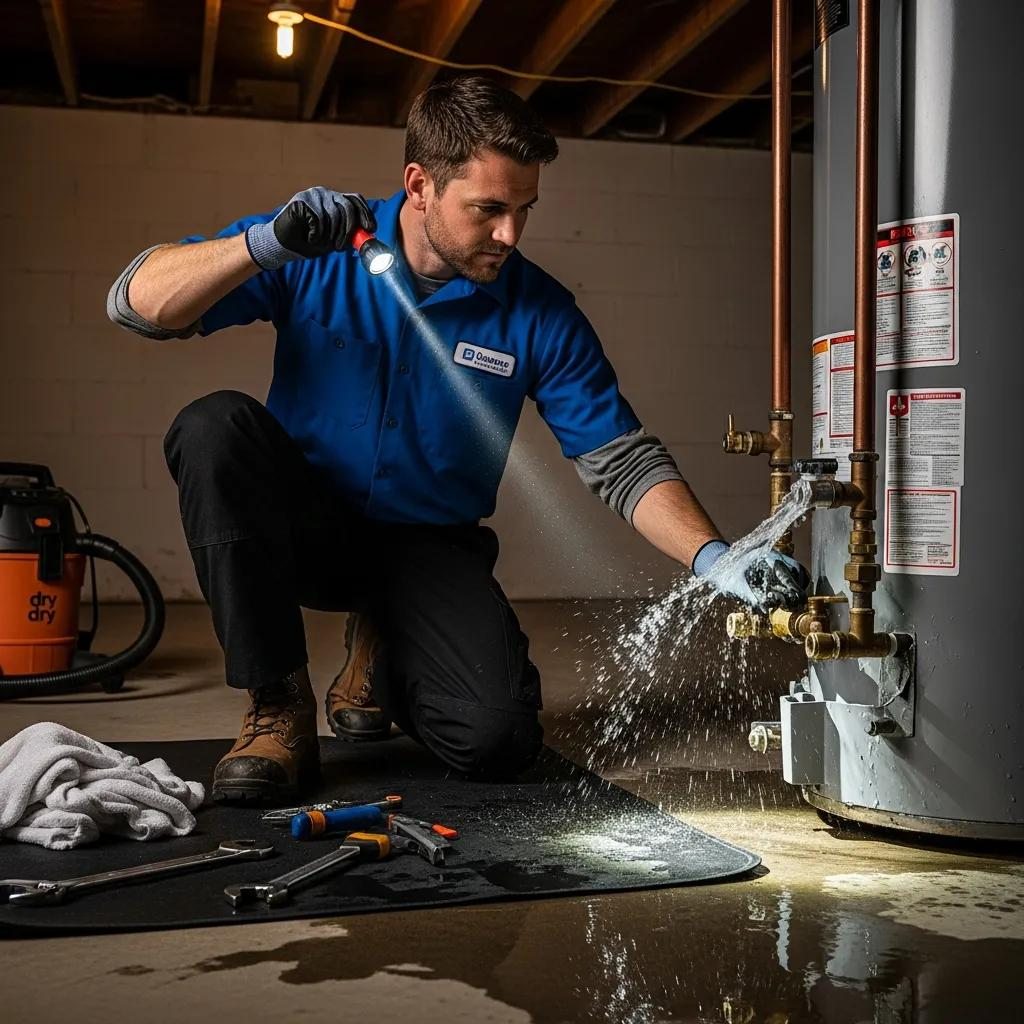
Seeing rusty water come out of your faucets can be alarming. It’s not only unpleasant to look at, but it can also make you question the safety of your home’s water supply. In Lenexa, many homeowners deal with discolored water at some point, and a common source of the issue is the water heater. Spotting rust-colored water doesn’t necessarily mean your plumbing system is failing, but it’s almost always a sign that something inside the water heater needs attention.
Rust in your water can lead to staining on laundry, damage to your fixtures, and concerns about overall water quality. The good news is that this is an issue that can be addressed quickly when identified early. Ignoring signs of rust may lead to larger and more expensive problems down the road. Knowing what causes the rust and how to handle it can help you take the right steps to keep your home’s water clean and safe.
Understanding Why Your Water Heater Produces Rusty Water
Over time, sediment and minerals can collect at the bottom of a tank-style water heater. This buildup can cause the inside of the tank to deteriorate, and when corrosion begins, rust particles can start to appear in your water supply. You may first notice this when running hot water through your sinks or bathtub. Sometimes it's subtle, other times it’s more obvious—like when water has a reddish-orange tint.
A big factor in rust water issues is the anode rod, which is a component placed in the tank to attract corrosive elements. It’s designed to break down over time instead of the tank itself. But once the rod becomes too worn, it can no longer protect the tank, and rust starts to form on the inside walls.
Some common reasons your water heater may be producing rusty water include:
- Internal corrosion due to a worn-out anode rod
- Sediment buildup causing damage to the tank lining
- Old age of the water heater
- High iron content in water reacting with metal components
- Lack of routine upkeep or flushing
For example, a homeowner in Lenexa might notice that only their hot water has a rusty color while the cold water remains clear. In that case, the problem likely points to the water heater. If it’s been several years since the unit was last checked or serviced, the contamination can build up and compromise the system faster than expected.
Rust doesn’t stop or reverse itself, so once your water heater starts to show signs of internal corrosion, it’s time to have a close inspection and take action before the tank starts leaking or causes more issues.
Potential Risks of Ignoring Rusty Water
Rust in your water doesn’t just affect appearance—it can slowly degrade other parts of your plumbing system and create health concerns. Even though a small amount of rust may seem like a minor issue, allowing it to persist can lead to bigger headaches.
When rusty water goes untreated, the risks include:
- Damaged plumbing: Corrosion can move through your pipes and cause clogs or leaks
- Reduced efficiency: A buildup of rust and sediment can make your heater work harder and waste energy
- Bad-tasting water: Rust changes taste and may give off an unpleasant metallic smell
- Appliance wear: Dishwashers and washing machines using rusty water can wear down faster
- Complete water heater failure: Continued corrosion will eventually crack or burst the tank
Homeowners should also consider the effect of rusty water on daily routines. Stains on white laundry, discoloration in your sinks or bathtub, and trouble trusting your tap water are everyday frustrations that grow worse over time. Left unaddressed, the damaging effects could lead to unexpected water heater replacement, or even water damage in your home if the tank starts leaking or bursts.
Addressing rusty water early protects your plumbing, safeguards water quality, and helps you avoid unnecessary repairs. If the hot water in your Lenexa home shows any signs of rust, consider this a sign to have your system reviewed before the problem escalates.
How Our Professionals Diagnose and Resolve Rusty Water Issues
Fixing rusty water in a home starts with identifying where the problem is coming from. If the rust appears only when using hot water, the water heater is often the main cause. Our professionals begin by examining the heater for obvious signs of wear, like rust near the drain valve, discoloration around fittings, or any signs of leaking. This simple inspection can tell a lot about the condition of the tank.
Once the source is confirmed, our technicians move forward with a more detailed approach. This usually includes draining the tank to inspect the water and sludge inside. If there's heavy sediment or visible rust, it often means the tank has not been cleaned in a while. They’ll flush the tank to clear out buildup and improve water quality. If the anode rod is found to be deteriorated, they replace it with a new one to give the tank extended protection against corrosion.
Typical repair steps include:
- Turning off power and water supply to the unit
- Draining the entire tank to clear out sediment and residue
- Inspecting and replacing the anode rod if needed
- Examining the tank lining and interior for corrosion spots or cracks
- Restarting and testing the system to confirm water quality conditions improve
This process is especially helpful for homeowners in Lenexa whose water heaters haven’t been serviced in years. A quick hands-on assessment from a qualified technician can reveal issues that homeowners often overlook. Acting on those findings helps avoid long-term damage and wasted money down the road.
Preventative Measures to Avoid Rusty Water
Water heater issues don’t usually happen overnight. Most are a result of long-term buildup, lack of maintenance, or outdated parts. Preventing rust from forming in your water supply means building regular checkups into your home care routine.
Here’s how to reduce the chance of dealing with rusty water:
- Schedule an annual flush of your water heater to eliminate sediment buildup
- Replace your anode rod every 3 to 5 years, depending on your water quality
- Keep an eye out for signs like discolored water, strange smells, or temperature inconsistency
- Never skip regular inspections, especially for older systems
- Don’t delay professional service when warning signs appear
If your home in Lenexa uses municipal water that’s known for having high mineral content, your tank could wear down faster. Installing a water softener or filtering system can help with this, but the most effective solution is regular maintenance. Many homeowners wait too long to act, only to find themselves dealing with leaks, cold water, or full tank replacements. Staying ahead of common problems can help save time and hassle later on.
Protect Your Lenexa Home With an Expert Water Heater Review
Addressing rusty water issues right when they start gives you more control over the lifespan of your equipment. A small bit of discoloration in the water may not seem like a big deal at first, but it’s usually a sign that something inside the heater is slowly wearing out. Over time, that minor problem can become a much more expensive one. Taking care of the problem today means clean, reliable water and less strain on your home’s plumbing system.
A lot of homeowners in Lenexa aren’t aware of what routine water heater service can prevent until their hot water turns brown or orange. While some signs are easy to miss, getting ahead of maintenance needs puts you in the best spot to avoid system breakdowns. Whether your system is aging, or the water coming from your fixtures isn’t looking right, this is the kind of job better left to trained technicians who work with hot water systems every day.
If you notice rust in your hot water, it might be time to address the issue before it worsens. Taking fast action helps protect your home from unexpected leaks and damage, ensuring that your water quality stays high. Homeowners in Lenexa can benefit from reliable service when issues arise, especially when water heater repair in Lenexa is handled by experienced professionals who know how to resolve sediment buildup and corrosion quickly. Patriot Heating & A/C understands that regular maintenance is key to preventing major failures in your system. For a quick estimate or to book a service visit, please contact us today.
Need Help? Call Patriot.
Call Us At: (913) 214-0883
Discover why so many homeowners trust Patriot Heating & AC with ALL of their Home Heating needs!
Customer Testimonials
See why customers trust our licensed and background-checked technicians and the quality service we deliver every time.
























Customer Testimonials
Latest Blogs


Maximize HVAC Energy Efficiency: Tips for Lower Bills



.svg)
.svg)

.webp)

